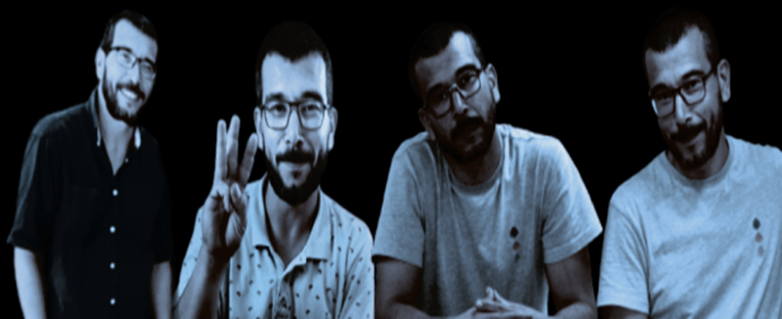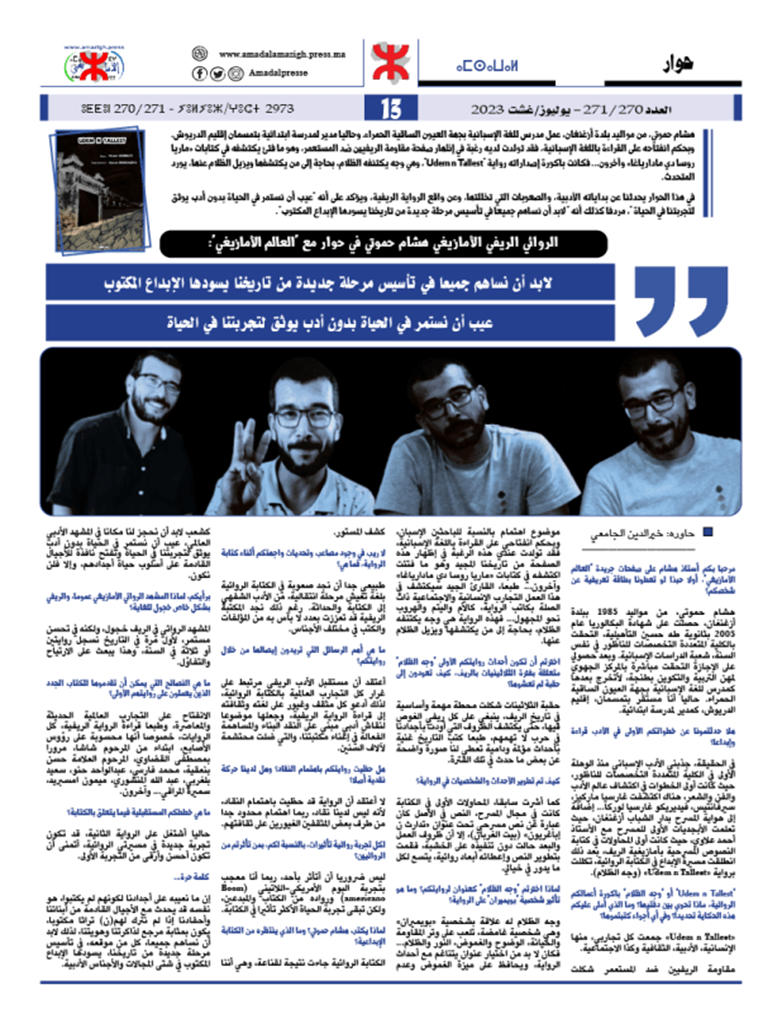Hisham Hamouti: We must all contribute to the establishment of a new phase in our history dominated by written creativity

Hisham Hamouti, born in the town of Azghanghan, worked as a Spanish language teacher in the Laayoune-Sakia El Hamra region. He is currently the principal of an elementary school in Tasman, Driush province. And by virtue of his openness to reading in the Spanish language, he had a desire to show the page of the resistance of the rural people against the colonialists, which he has been discovering in the writings of “Maria Rosa de Madariaga” and others … so his first publication was the novel “Udem n Tallest”, which is a face shrouded in darkness, in need of He who discovers it and removes the darkness from it, reprimands the speaker.
In this dialogue, he tells us about his literary beginnings, the difficulties that permeated them, and the reality of the rural novel, and stresses that it is “a shame to continue living without literature documenting our experience in life,” adding that “we must all contribute to the establishment of a new phase of our history dominated by creativity.” written.”
We must all contribute to the establishment of a new phase of our history dominated by written creativity
It is a shame that we continue to live without literature documenting our experience in life
Welcome, Mr. Hisham, to the pages of “The Amazigh World” newspaper. First, would you like to give us an identification card about your person?
Hisham Hamouti, born in 1985 in the town of Azghanghan, obtained a baccalaureate degree in 2005 from Taha Hussein Qualifying High School, and joined the multidisciplinary college of Nador in the same year, the Spanish Studies Division. After obtaining my license, I joined the Regional Center for Education and Training Professions in Tangier, after which I graduated as a Spanish language teacher in the Laayoune-Sakia El Hamra region. Currently, I am based in Tasman, Driush province, as a primary school principal.
?Would you tell us about your first steps in literature, reading and creativity
In fact, Spanish literature attracted me from the first moment in the Polydisciplinary College of Nador, where the first steps were in discovering the world of literature, art and poetry. There I discovered García Márquez, Cervantes, Federico García Lorca... In addition to the hobby of theater at the Youth House Azagangan, where I learned the first alphabets of theater With Professor Ahmed Allawi, where the first attempts were made to write theatrical texts in rural Amazigh, after that the journey of creativity in novel writing began, culminating in the novel “Udem n Tallest” (The Face of Darkness).
“Udem n Tallest” or “The Face of Darkness” is the first of your works of fiction. What does it contain? What exactly dictated this story to you? And in what atmosphere did you write it?
Udem n Tallest collected all my experiences, including human, literary, cultural and social ones.
The resistance of the rural people against the colonialists was a topic of interest for Spanish researchers, and by virtue of my openness to reading in the Spanish language, I had this desire to show this page of our glorious history, which I have been discovering in the writings of “Maria Rosa de Madariaga” and others … Of course, the good reader will discover in This work deals with the human and social experiences related to the writer of the novel, such as the mother, the orphan, and the escape towards the unknown... This novel is a face shrouded in darkness, in need of someone to discover it and remove the darkness from it.
You chose to have the events of your first novel, “The Face of Darkness,” related to the thirties in the countryside. How do you return to an era that you did not live in?
The era of the thirties constituted an important and essential station in the history of the countryside, which every rural person should dive into, in order to discover the circumstances that killed our ancestors in a war that did not concern them. Of course, history books are rich in painful and bloody events that give us a clear picture of some of what happened in that period.
?How are the events and characters developed in the novel
As I mentioned earlier, the first attempts at writing were in the field of theater. The text was originally a theatrical text under the title “Tadare n Ibagriyon” (The House of Crows), but the working conditions and distance prevented it from being implemented on the stage, so I developed the text and gave it narrative dimensions. It accommodates everything in my imagination.

Why did you choose “The Face of Darkness” as the title of your novel? And what is the impact of the “Boymeran” character on the novel?
The face of darkness has to do with the character of "Boymeran", a mysterious character, who plays on the chords of resistance and betrayal, clarity and ambiguity, light and darkness... It was necessary to choose a title that is in harmony with the events of the novel, and preserves the advantage of ambiguity and not revealing the hidden.
?There is no doubt that there are difficulties and challenges you faced while writing the novel, what are they
It is very natural that we find it difficult to write fiction in a language that is in a transitional stage, from oral literature to writing and modernity. Despite this, we find that the rural library has been enriched with a good number of literature and books in various genres.
?What are the most important messages that you want to convey through your novel
I believe that the future of rural literature, like all global experiences, is linked to novel writing. Therefore, I invite every intellectual who is jealous of his language and culture to read the rural novel, and make it a subject of literary discussion based on constructive criticism and effective contribution to enriching our library, which has remained indecent for thousands of years.
?Did your novel receive critical attention? And do we have cash movement in the first place
I do not think that the novel has received the attention of critics, because we do not have critics, perhaps very limited interest on the part of some intellectuals who are jealous of their culture.
?Every novelist experience has effects. For you, who were the novelists influenced by
It is not necessary to be influenced by anyone. Perhaps I admire the experience of Boom americano and its pioneering writers and creators, but the most influential life experience remains in writing.
?Why write Hisham Hamouti? What is expected of creative writing
Fiction writing came as a result of a conviction, which is that we, as a people, must reserve a place for us in the global literary scene.
?In your opinion, why is the Amazigh novel scene in general, and the rural one in particular, so shy
The novel scene in the countryside is shy, but it is constantly improving. For the first time in history, we record two or three novels a year, and this is a source of comfort and optimism.
?What advice would you give to new writers working on their first novel
Openness to modern and contemporary global experiences, and of course reading the rural novel, all novels, especially since they are counted on tiptoe, starting with the late Shasha, passing through Mustafa al-Qadawi, the late Allama Hassan Benakia, Muhammad Farsi, Abdelwahid Hanno, Saeed Belgarbi, Abdullah al-Manshuri, Maymoon Amspread, Samira El-Maraki, and others.
?What are your future plans for writing
I am currently working on the second novel. It may be a new experience in my novel career. I hope it will be better and more refined than the first experience.

Free word...
What we blame on our ancestors for not writing, the same may happen with future generations of our children and grandchildren if we do not leave them (n) a written heritage, which serves as a reference to our memory and our identity, so we must all contribute, each from his position, in the establishment of a new stage of Our history, dominated by creativity written in various fields and literary genres.
Interviewer: Khair Al-Din Al-Jami
Source: websites

